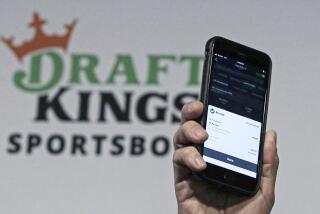This Season Wasn’t Bookmakers’ Best
- Share via
He said he is a student of gambling, but that hardly makes him the wizard of odds. He lost $40,000 this year as an illegal bookmaker.
“But logically, it’s more,” he said, then grinned. “I figure with the value of my time, I should have won about $50,000. So this year cost about $90,000.”
Taking time from the busy Super Bowl betting season, Bill agreed to discuss his trade on condition that he not be identified.
So why was he smiling after talking about a $40,000 loss? Because, he said, he was not alone.
“What I hear, this has been one of the poorest seasons for the bookmaker,” Bill said. “The players I knew who were constant losers had banner years. Bookmakers did not have a party this football season.”
The prospects are doubtful that it will change now that the biggest sports party of them all is upon us.
“It’s bad that it’s San Francisco and Denver from a bookmaker’s view,” he said. “The closer the game, the more interest. It makes a difference who is involved because there would be more money bet on a closely contested game than a one-sided game.
“It would be very meaningful to TV that this game was between the Cleveland Browns and Rams, which might be a pick ‘em (even point spread) rather than (this).”
San Francisco, which started as a 10-point favorite, is listed at 12 1/2 or 13.
Bill, who said he once was a gambler, laments the use of computerized data systems that he says help bettors reduce the bookmaker’s advantage.
“I’m amazed what these touts can tell people,” he said. “This team lost seven out of eight on artificial grass, but on regular grass they’ve won every game. I didn’t know that stuff.”
Some have enlisted computers to analyze the information, then predict winners. Computer Group, headed by Dr. Ivan Mendlin of Las Vegas, was investigated by FBI agents in 1985 because of its successful sports betting ventures.
“When (Computer Group) comes out with a choice on a given weekend, there is like a raging fire,” Bill said. “The quotation is: the Computer boys picked this game. Then the whole country goes with that game. I’ll never forget one week it was Army. I’ll tell you there were people who never bet Army in their life. All of a sudden on this day, they couldn’t wait to get down on Army. And they won.
“They’re not betting their opinions so much. They’re not the rank suckers that I used to deal with. So it is more difficult today.”
Despite this, Bill said bookmakers can earn between $40,000 and $60,000 a year with a low-profile operation. However, most who have visible operations earn six-figure incomes, experts agree.
This, for the 16-week National Football League regular season.
“Let’s say I want to try to win a half-million dollars,” Bill said. “I’d have to stay open the entire year, and become a year-round sports book and hire agents. If I want to hire three or four clerks, get some agents I can build a multimillion-dollar business, get famous and go to jail.”
To develop a successful business, Bill said, bookmakers must be aware of credit.
“This business is built entirely on credit,” he said. “And credit that is unenforceable on both sides. What you have going for you is your ability to pay . . . your reputation in your ability to pay the bettor who wins. What’s important is the customers’ ability to pay. The fact is, (it) is so easy to wager excessive amounts of money because it is difficult to determine what a person can afford to lose.
“I’m more interested in credit than I am in how many games I win or lose at the end of the season.”
Bill said avoiding police detection starts with doling out credit. He said he puts stringent limits on his bettors, so they do not become too indebted. If they lose too much, the trouble begins.
“The bettor may give your number to the police hoping you will get arrested,” Bill said.
Or a spouse discovers the bookmaker’s telephone number and informs authorities.
When wagering records are confiscated, the bookmaker has no proof of what is owed. Suddenly, the week’s previous bettors claim winners.
“If bookmakers want to hold their customers, they’d better pay them,” he said. “So it can be costly.”
More to Read
Go beyond the scoreboard
Get the latest on L.A.'s teams in the daily Sports Report newsletter.
You may occasionally receive promotional content from the Los Angeles Times.










